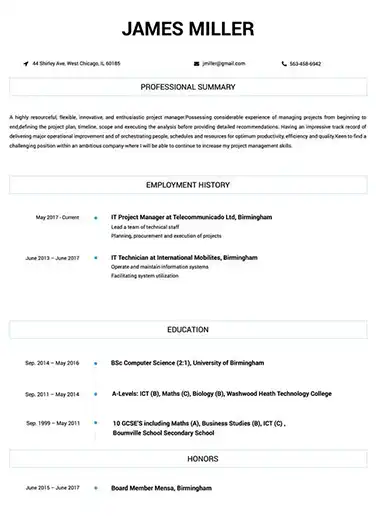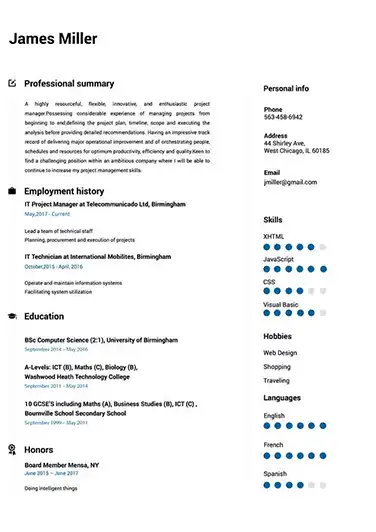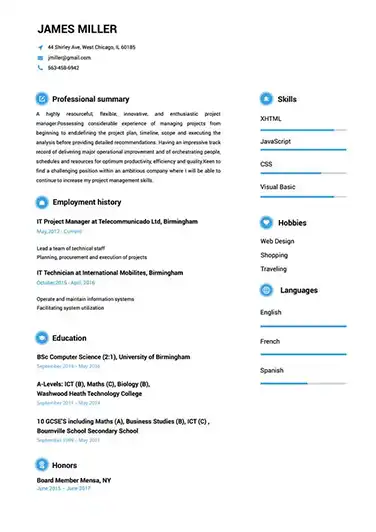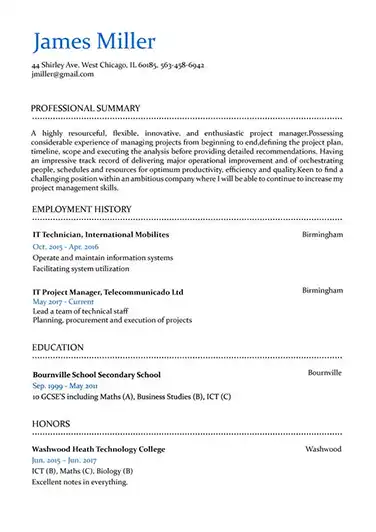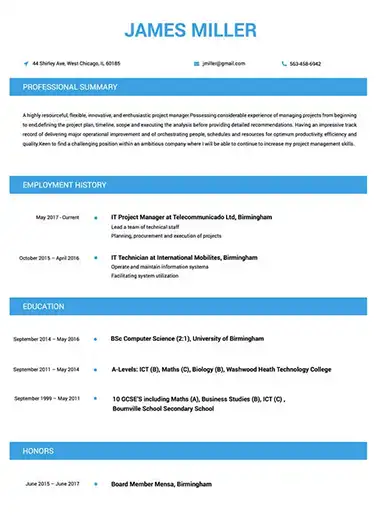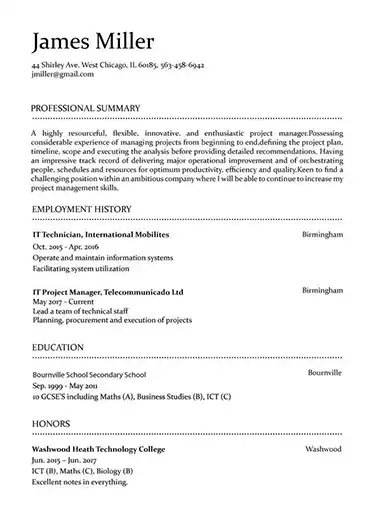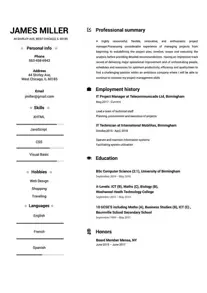 Use This Template
Use This Template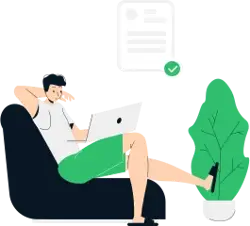
Build your resume in 15 minutes
Create an awesome resume that meets the expectations of potential employers with our selection of professional, field-tested resume templates.
college student: Resume Samples & Writing Guide
wilson-ollie@inbox.com
606-667-2723
Employment history
- Maintain student records and grades
- Facilitate classroom discussions and activities
- Engage in research activities related to the field of education
- Facilitate classroom discussions and activities
- Maintain student records and grades
- Evaluate student performance and progress
- Monitor student attendance and progress
- Participate in student recruitment and outreach activities
- Prepare and deliver lectures to students
Education
Skills
Do you already have a resume? Use our PDF converter and edit your resume.
taylorkyle@yahoo.com
969-386-6059
Professional Summary
Employment history
- Develop lesson plans and teaching materials
- Maintain student records and grades
- Develop and implement student assessment tools
- Prepare and deliver lectures to students
- Supervise student activities and provide guidance
- Assist students with coursework and understanding of material
- Facilitate classroom discussions and activities
- Prepare course syllabi and evaluate student work
- Maintain student records and grades
Education
Skills
turnerroy@icloud.com
871-828-7446
Professional Summary
Employment history
- Develop and implement student assessment tools
- Collaborate with faculty and staff to develop curriculum
- Participate in professional development activities
- Participate in student recruitment and outreach activities
- Maintain student records and grades
- Facilitate classroom discussions and activities
- Evaluate student performance and progress
- Collaborate with faculty and staff to develop curriculum
- Engage in research activities related to the field of education
Education
Skills
walker_danny@yandex.com
623-745-8105
Employment history
- Maintain student records and grades
- Collaborate with faculty and staff to develop curriculum
- Assist students with coursework and understanding of material
- Prepare course syllabi and evaluate student work
- Maintain student records and grades
- Engage in research activities related to the field of education
- Collaborate with faculty and staff to develop curriculum
- Evaluate student performance and progress
- Assist students with coursework and understanding of material
Education
Skills
lewiscarl@inbox.com
709-476-0250
Professional Summary
Employment history
- Develop and implement student assessment tools
- Maintain student records and grades
- Participate in professional development activities
- Develop lesson plans and teaching materials
- Prepare course syllabi and evaluate student work
- Maintain student records and grades
- Facilitate classroom discussions and activities
- Engage in research activities related to the field of education
- Collaborate with faculty and staff to develop curriculum
Education
Skills
Not in love with this template? Browse our full library of resume templates
Writing a resume as a student or recent grad is no easy feat. You’re ready to launch your career but you don’t have as much experience as other candidates. And applying to job after job with not so much as a callback can be incredibly frustrating.
The good news is, job searching doesn’t have to be that way. We’re here to help. In order to stand out (and secure interviews), you need a student resume that stands out.
In this writing guide, we’ll cover what it takes to create a resume that will impress recruiters. We’ll walk you through top template examples and break down step-by-step how to write a student resume. After reading this guide, you’ll know:
- How to properly format your resume
- What recruiters will look for on a student or recent grad’s resume
- Which skills you should mention on your resume (and how to do it the right way)
- Which achievements to mention (and how to add them correctly)
- How to stand out from other candidates as a student and why that’s important in your job search process
- How to write an engaging and unique resume objective (with examples)
- How to structure your resume if you have little/no experience or achievements to list
- How to include your education and education-related achievements including:
- Coursework
- Thesis titles
- Key academic achievements
- Association members
- Student organizations
- How to list volunteer experience
- How to list honors or awards
- How to list internship experience and why these are important to land jobs
We’ll also discuss the difference between applying for an internship versus an entry-level job and how you need to adjust your resume for each. And lastly, we’ll provide you with a top resume building tool to help you land your first gig. Let’s dive in.
Multiple template examples
How to write a student resume that will get you through the doors
The key to writing a student resume that will get you through the doors, all starts with the design. As a student especially, you need a template that is sure to turn heads and catch eyes. If it isn’t designed well, your chances of getting called in for an interview are virtually next to nothing.
According to Glassdoor, a corporate job posting attracts, on average, 250 applications. Of those hundreds of applicants, only 4 to 6 will get called in for an interview.
Frankly, those aren’t the best odds. And realistically, a recruiter isn’t going to take the time to read every resume in-depth. They’re busy with other tasks and projects. Instead, they scan resumes. And most of the time, resume design will be the most important part of their first impression.
A boring template will blend in with everyone else. You need something that will stand out. Follow these tips to create an eye-catching design:
- Don’t use a word processor to design your resume. Using Microsoft Word severely limits your layout and design capabilities. Find a professionally-designed resume template instead.
- Use an easily digestible font: It’s best to stick with simple, readable fonts. We’re not saying you need to use Times New Roman, but don’t use anything too trendy or hard to read.
- Consider adding a splash of color: When done right, adding color to your resume can help it stand out. Just make sure you don’t get carried away and stand out for the wrong reasons. Use it minimally and don’t use neon or bright - distracting colors. Stick to soft, neutral tones.
- Add a border. Adding a border around your resume can be a subtle way to differentiate yourself from other candidates.
- Use data visualizations or infographics for your skills section: Using data visualization can break up big chunks of text on your resume and visually demonstrate your experience level.
And remember - your resume should only be one page in length. Next we’ll cover top formatting tips and tricks.
How to format the resume
Resume formatting is an important element of your overall resume design. If you don’t format it correctly, your resume will look unprofessional and poorly put together.
Stick to straightforward resume sections so they don’t distract from the content of your resume. In general, a student resume should include the following sections:
- A header section: In this section, you should include your full name, phone number, and email address. If possible, hyperlink your contact information so the recruiter can click on it easily.
- An objective section: Underneath your header section, write a short objective. It should be a few sentences that detail why you’re interested in applying for the job at hand.
- An education section: As a student, your education section is especially important. Include your college/university and area of study. If you have a GPA over 3.5, that’s worth including too. In this section, you can also add relevant coursework, study abroad experience, and involvement in extracurriculars, among other things.
- An experience section: Here, you can add internship experience or jobs you held throughout college. Be sure to list your achievements rather than your daily responsibilities.
- A skills section: Since you’re relatively inexperienced, your skills section is extra important. Include both soft and hard skills in this section.
Though it can be tempting to add as much content as you can, try to think concisely. Resumes that are overloaded with content can be difficult and overwhelming to read. When it comes to resumes, sometimes less is more.
Pick a design that has plenty of white space so it’s easy to scan and digest. That will also help you focus on what’s most important and relevant. Use at least one-inch margins and align text to the left.
You’ll also want to use multiple fonts and font sizes to format your resume. This can help differentiate section headings and other important information. Bolding and italicizing can also be used to highlight important subheadings. Be sure to pick fonts that compliment each other.
What recruiters will look for when applying for entry-level jobs
Entry-level jobs can be especially competitive. And recruiters are often under a lot of pressure to fill positions quickly. In addition to academic achievements, there are a number of things they’ll look for in a student’s resume.
In short, recruiters look for well-rounded individuals that have a strong will to succeed. But how do you demonstrate this on your resume?
For starters, recruiters will want to see that you took the job requirements into account when writing your resume. Pay close attention to the job posting, company mission, and company culture while working on your resume. Make a list of the core responsibilities and feature them prominently on your resume from the get-go.
This means more than just adding the skills the employer is seeking to your resume. You should tailor your education and experience section to the job too. Include relevant coursework, class assignments, and group projects. Were there aspects of your internship or part-time job that had overlapping or similar responsibilities? Add them to your experience section, if so.
Secondly, you’ll want to focus on including facts, not just fluff, on your resume. It’s easy to rely on buzzwords and generic statements, but doing so actually does you a disservice. Saying you have a go-getter attitude, with attention to detail and a strategic mindset might sound impressive, but it doesn’t really mean anything when it comes down to it. And it certainly doesn’t convince a recruiter to call you in for an interview.
Instead of simply listing teamwork as a skill or strength, demonstrate it with a real-world example. You could say, “delegated tasks to team members and managed timelines which resulted in a project grade of 98%.”
In your resume, you’ll also want to demonstrate your desire to learn. For many companies, a strong work ethic and a genuine interest in the industry can be just as valuable as related work experience. A recruiter doesn’t want to hire someone who’s going to be miserable and unmotivated. No one wants to be around people like that.
A great way to show your enthusiasm is to highlight experiences that have helped you grow personally and professionally. Say you’re applying for an entry-level sales position. You could include your involvement with business-related organizations you joined in college. If you want to work for a nonprofit - add any volunteer or fundraising experience you have.
What skills to mention and how to do it correctly
Skills are especially important to student resumes. You might not have as much experience as other candidates, but that doesn’t mean you don’t possess some of the same skills. Though you should tailor your skill section to the type of job you’re applying for, there are some universally sought-after soft skills. They include:
- Communication
- Reliability
- Responsibility
- Teamwork
- Attention to detail
These skills are at the cornerstone of almost every job. The correct way to list them is with real-world examples. Otherwise, they carry little meaning to a recruiter.
But the best way to write your skills section is to match them with the job listing. Make a list of all the skills you have and include the closest matching ones on your resume. Recruiters sometimes use software that scans your resume for keywords. Using the job posting as a reference for your resume greatly increases the chances you’ll get called in for an interview.
What achievements to mention and how to do it correctly
Achievements can be an excellent way to set yourself apart from other students. Some examples of achievements to mention include:
- Scholarships
- Honor roll recognition
- Awards won
- Publications
- Attendance awards
- Promotions
- Work-related awards
- Athletic awards
- Volunteer-related awards
Be as specific as possible when it comes to listing your achievements. The more context recruiters have, the better.
How to stand out from the crowd as a student and why it’s important
The best way to stand out from the crowd is to demonstrate how you’re different from other students. At the end of the day, recruiters want to hire people who are going to bring the most value to an organization.
In short, they want to see what kind of value you can bring to the company. The best way to show what you’re capable of is to list your achievements rather than your responsibilities. Let us repeat that again, for emphasis. List your achievements rather than your responsibilities.
This is one of the most common mistakes students make when writing a resume. And trust us - we get it. Many students just bullet out their day-to-days tasks in the experience section of their resume. But doing what everyone else does won’t get you far. You’ll just blend in and be another paper in the pile.
Instead, focus on major achievements at your jobs and list those. What kind of change did you bring? How did you positively affect the organization? What did you do that no one else did? If possible, try to quantify your achievements (for example - “increased sales by 12%”). It adds even more credibility.
Standing out from the crowd is incredibly important. If you aren't able to stand out, you won’t even get called in for an interview and you certainly won’t be getting job offers anytime soon. Keep this in mind while writing your resume.
How to write a resume objective and examples of this
A resume objective is a recruiter’s first introduction to you as a candidate. So, no pressure, but it better leave a lasting first impression. It should be right under your header section and just a few sentences in length.
When writing a resume objective, you should focus on what the employer will gain if they hire you. This isn’t a summary of your education or experience. It’s a paragraph to talk about your goals and how they relate to the position you’re applying to.
Be sure to be as specific as possible in your resume objective. What exactly can you bring to the table? If you’re vague, you risk boring a recruiter. And if you don’t leave a lasting impression, your resume won’t give it a second look.
To write an engaging resume objective, start with a strong trait and show how your education has prepared you to excel in this job. Mention the position you’re applying for and demonstrate how you’re going to bring value to the company.
Sample of a wrong resume objective:
I am a recent B.B.A graduate seeking a position in digital marketing. I am dedicated and detail-oriented and hope to bring my skills to Leo Burnett.
This resume doesn’t scream, “Wow. We need to hire this person.” It’s pretty vague and isn’t backed by any supporting evidence.
Sample of a right resume objective:
Exceptionally driven Bachelor of Business Administration graduate seeking a digital marketing position at Leo Burnett. I will use social media, SEO, and data-analysis to increase traffic and build brand awareness for clients.
This resume objective is much more specific. It shows exactly how this candidate is going to make a difference. It also gives a recruiter more information about their skillset and how they can apply it to achieve the organization’s overarching goals.
The second resume objective is much more likely to impress a recruiter.
How to structure the resume if you have no experience or achievements to list
Many students feel like they have no experience or achievements worth mentioning. But everyone has accomplishments that are resume worthy. And believe it or not, you probably have more than you initially think of.
Start by listing your education. If you had a GPA above 3.5 or received any academic related honors, include them on your resume.
Even if you don’t have much work experience, you probably have activities or volunteer work that you can list. Some of your interests and hobbies might even be relevant to your job application.
How to detail your education and additional education-related achievements
As a student, your education section will be more important and expansive than candidates who have been in the workforce for a few years. While other candidates will simply list their college or university and major, you’ll want to go into more detail.
If you’re a student, you should include the following in your resume:
- Relevant coursework
- Thesis titles
- Key academic achievements
- Association memberships
- Class projects
- Student organizations
- Study abroad experience
- Any other campus-related experience
How to list volunteer experience or honors and awards
If you have volunteer experience, you should absolutely add it to your resume. Recruiters look for well-rounded individuals who are involved in their community. Be sure to list your position title (if other then volunteer) and the name of the organization. If you have the space for it, it can also be helpful to add a brief description of your day-to-day responsibilities.
Honors and awards can also be a great addition to your resume. Include any academic honors you received (Dean’s List, President’s List, Honors Program graduate, etc.) as well as any awards you received. These can help a recruiter get a better sense of your drive and discipline and see your strengths first-hand.
How to list internship positions and why these are important to land you jobs
Internships are perhaps the most important part of your resume. Sure, classes and assignments matter, but nothing beats real-world experience. To effectively list your internship experience, you’ll want to list your position title, the company names, the dates you’ve worked there, and a few bulleted points that detail your accomplishments.
Internships are important in landing you jobs because they give you skills and experience you simply can’t get in a classroom. They also help you develop soft skills that will make you more competitive compared to candidates who didn’t do an internship in college.
No matter what industry your internship was in, you likely improved both your written and oral communication skills, for example. The situations that helped you develop these skills can’t be replicated in a classroom setting.
If you didn’t do an internship in college - don’t worry. You can still write a fantastic resume. You just have to get a little more creative with the other sections of your resume.
What additional information you can add to the resume as a recent graduate
If you still have extra space on your resume, consider adding an interest or hobby section. This can help a recruiter get a better sense of who you are as a person. Avoid adding anything that could be perceived as unprofessional.
Instead, focus on your interests that align with the company or position. For example, if you’re applying to a graphic design position, you could add drawing as an interest.
What will be the difference when applying for an internship and entry-level job
Applying for an internship and an entry-level job is very different. For an internship position, you’re mostly going up against other students or recent grads. For an entry-level position, you’re going up against recent grads *and* people that are relatively new to the workforce. That’s because entry-level jobs are typically targeted towards anyone with 0-3 years of experience.
In short, entry-level jobs are a bit more competitive. But landing one can have a much higher payoff. You’ll earn more money and have more benefits than you will with an internship.
On the other hand, an internship can be a great starting point for your career. Because they’re less competitive, you can be a little pickier and choose the one you really want to do, as opposed to taking the first full-time job offer you get. That can greatly affect the path of your career.
How Resume Build could help you create a perfect resume
Resume Build is an online tool that helps you create a professional-looking resume in just 5 minutes. With more than twenty HR-approved templates to choose from, you can create the perfect resume for jobs across any industry.
Resume Build even has pre-written examples so you don’t have to start from scratch. Just choose your template, show the world what you’re made of, and start sending it off. You’ll be on your way to interviewing before you know it.
Whether you’re still a student or recent graduate - using a pre-written resume can add the extra flair that you’re looking for. Just replace the resume details with your experiences, education and skills, and you’ll start getting callbacks in no time.
If you’re ready to get started, you can learn more here.
college student Job Descriptions; Explained
If you're applying for an college student position, it's important to tailor your resume to the specific job requirements in order to differentiate yourself from other candidates. Including accurate and relevant information that directly aligns with the job description can greatly increase your chances of securing an interview with potential employers.
When crafting your resume, be sure to use action verbs and a clear, concise format to highlight your relevant skills and experience. Remember, the job description is your first opportunity to make an impression on recruiters, so pay close attention to the details and make sure you're presenting yourself in the best possible light.
college student
- Studied Social Entrepreneurship course
- Explored social entrepreneurs’ motivationns
- Presented a big project relating to a social impact
- Learned strategies employed by successful social entrepreneurs
college student
- Was a staff in SAMPANESIA, a sub-event in SAMPAN which concerns art festival, which held by Naval Architecture major
- A member at ITS Music
- A member at PSM ITS
- A member at ITS Muay Thai
- Maintained atmosphere of academic learning and advancement to facilitate learning and development of critical thinking skills
- Enrolled in LDKM, LKMW, PKTI-TD
- Maintained a good GPA
college student
- Sandblasting motors to clean them
- painting
- Outside Maintenance
- Removing and Installing railroad ties
- Removing and installing felt on the paper machine
- Fifth hand on the paper machine
- Janitor
college student /athlete
- Attended Mississippi College in 2016 until 2017. A student that is transferring to another institution in the nearby area. While there he studied business and public speaking along with completing a college algebra course , English composition, world civilization I , Intro Psychology, and varsity football the first semester . Both semesters while attending Mississippi College there was a total of 31 hours received.
- Survived regeneration process at Naval Architecture
- Attending various art festivals
- Achieved 563 TOEFL score
college student
- Sketch rough and details of the design with specifications such as color schemes, construction, material types, and accessory requirements, design custom clothing and accessories for individuals/clients.
- Research production specifications, production materials and manufacturing methods, and provide cost estimates and itemized production requirements.
- Observe assistants’ work throughout the design process to ensure the precision of the desired outcome of the product.
- Visit textile showrooms to keep up-to-date on the latest fabrics and test fabrics or oversee testing so that garment care labels can be created. Select quality materials and techniques like fabric manipulation, experiment design concepts to be used for the product/garment.
- Consult with professionals and executives to collaborate or with clients in order to discuss design ideas, negotiate with client’s inquiries.
- Styling and design consultation.
- Identify and research target markets and target customers for designs, looking at factors such as demographical, psychological, geological, and socioeconomic status.
college student Job Skills
For an college student position, your job skills are a key factor in demonstrating your value to the company and showing recruiters that you're the ight fit for the role. It's important to be specific when highlighting your skills and ensure that they are directly aligned with the job requirements, as this can greatly improve your chances of being hired. By showcasing your relevant skills and experience, you can make a compelling case for why you're the best candidate for the job.
How to include technical skills in your resume:
Technical skills are a set of specialized abilities and knowledge required to perform a particular job
effectively. Some examples of technical skills are data analysis, project management, software proficiency,
and programming languages, to name a few.
Add the technical skills that will get hired in your career
field with our simple-to-use resume builder. Select your desired resume template, once you reach the skills
section of the builder, manually write in the skill or simply click on "Add more skills". This will
automatically generate the best skills for your career field, choose your skill level, and hit "Save &
Next."
- Data Science
- Programming
- Algorithm Design
- Mathematics
- Statistics
- Machine Learning
- Data Visualization
- Data Mining
- Software Development
- Web Development
- Computer Science
- Coding
- Cloud Computing
- Artificial Intelligence
- Networking
- Cybersecurity
- Mobile App Development
- Database Administration
- Linux Administration
- System Administration
How to include soft skills in your resume:
Soft skills are non-technical skills that relate to how you work and that can be used in any job. Including
soft skills such as time management, creative thinking, teamwork, and conflict resolution demonstrate your
problem-solving abilities and show that you navigate challenges and changes in the workplace
efficiently.
Add competitive soft skills to make your resume stand-out to recruiters! Simply select
your preferred resume template in the skills section, enter the skills manually or use the "Add more skills"
option. Our resume builder will generate the most relevant soft skills for your career path. Choose your
proficiency level for each skill, and then click "Save & Next" to proceed to the next section.
- Communication
- Interpersonal
- Leadership
- Time Management
- Problem Solving
- Decision Making
- Critical Thinking
- Creativity
- Adaptability
- Teamwork
- Organization
- Planning
- Public Speaking
- Negotiation
- Conflict Resolution
- Research
- Analytical
- Attention to Detail
- Self-Motivation
- Stress Management
- Collaboration
- Coaching
- Mentoring
- Listening
- Networking
- Strategic Thinking
- Negotiation
- Emotional Intelligence
- Adaptability
- Flexibility
- Reliability
- Professionalism
- Computer Literacy
- Technical
- Data Analysis
- Project Management
- Customer Service
- Presentation
- Written Communication
- Social Media
- Troubleshooting
- Quality Assurance
- Collaboration
- Supervisory
- Risk Management
- Database Management
- Training
- Innovation
- Documentation
- Accounting
- Financial Management
- Visualization
- Reporting
- Business Acumen
- Process Improvement
- Documentation
- Relationship Management.
How to Improve Your college student Resume
Navigating resume pitfalls can mean the difference between landing an interview or not. Missing job descriptions or unexplained work history gaps can cause recruiters to hesitate. Let's not even talk about the impact of bad grammar, and forgetting your contact info could leave your potential employer hanging. Aim to be comprehensive, concise, and accurate.
Professional Summary
Employment history
- Prepare course syllabi and evaluate student work
- Develop lesson plans and teaching materials
- Monitor student attendance and progress
- Facilitate classroom discussions and activities
- Collaborate with faculty and staff to develop curriculum
- Evaluate student performance and progress
Education
Skills
Include your Contact Information and Job Descriptions
Missing job descriptions lessens your chances of getting hired.
Key Insights- Employers want to know what you've accomplished, so make sure to include descriptions for all of your previous jobs.
- Keep job descriptions short but don't just list your jobs.
- Never copy-paste a job description to post on your resume. Get inspired and use tools to help you write customized descriptions.
How to Optimize Your college student Resume
Keep an eye out for these resume traps. Neglecting to detail your job roles or explain gaps in your career can lead to unnecessary doubts. Grammar blunders can reflect negatively on you, and without contact information, how can employers reach you? Be meticulous and complete.
gus-hall@outlook.com
863-832-3551
Employment history
- Fascilitate clasroom discusions and activites.
- Prepear and deliver lecutres too student's.
- Moniter student attendence and progess.
- Colaborate wth facult and staf too develop curiculum.
- Developd annd implementt studentt assessmentt toolss.
- Evaluate student performence an progress.
- Parcticipate in student recuritment and outeach activites.
- Developp and implemnt studnet assessmnet toolls.
- Provide individualized instruction and guidiance too students.
Education
Skills
Correct Grammar and Address Gap Years in Your Resume
Don't leave unexplained gaps in your work history.
Key Insights- When explaining gaps in your employment section, start by being honest.
- Elaborate on the gap and show that you never stopped learning.
- Explain and elaborate any gap in your work history by highlighting new skills.
college student Cover Letter Example
A cover letter can be a valuable addition to your job application when applying for an college student position. Cover letters provide a concise summary of your qualifications, skills, and experience, also it also gives you an opportunity to explain why you're the best fit for the job. Crafting a cover letter that showcases your relevant experience and enthusiasm for the Accounts Payable role can significantly improve your chances of securing an interview.
Wilson wilson-ollie@inbox.com
606-667-2723
757 Alderwood Drive, Clinton, OH
44216
Teach For America
New York City, New York
To the respected Teach For America Recruitment Team
As a College Student with a proven track record of success in Education, I am excited to apply for the Lead College Student position at Teach For America. I believe that my skills and expertise would make a valuable contribution to your team.
As someone who has always been driven by a desire to solve complex problems and make a difference in the world, I have pursued opportunities to learn and grow throughout my life. My experience in this field has equipped me with valuable skills such as Written Communication and Accounting that have planted in me a great work ethic. I am excited to apply these skills and my enthusiasm for Education to the role and contribute to your organization's success.
I appreciate the opportunity to apply for the Lead College Student position. I am confident that I can make a valuable contribution to your organization and that together there is no challenge that we cannot overcome. I will be waiting, hopeful for what the future will bring.
Respectfully,
Ollie Wilson
606-667-2723
wilson-ollie@inbox.com
Ollie Wilson
Showcase your most significant accomplishments and qualifications with this cover
letter.
Personalize this cover letter in just few minutes with our user-friendly tool!
Related Resumes & Cover Letters
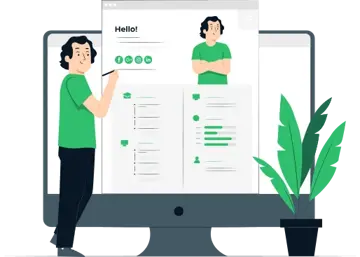
Build your Resume in 15 minutes
Create an awesome resume that meets the expectations of potential employers with our selection of professional, field-tested resume templates.

